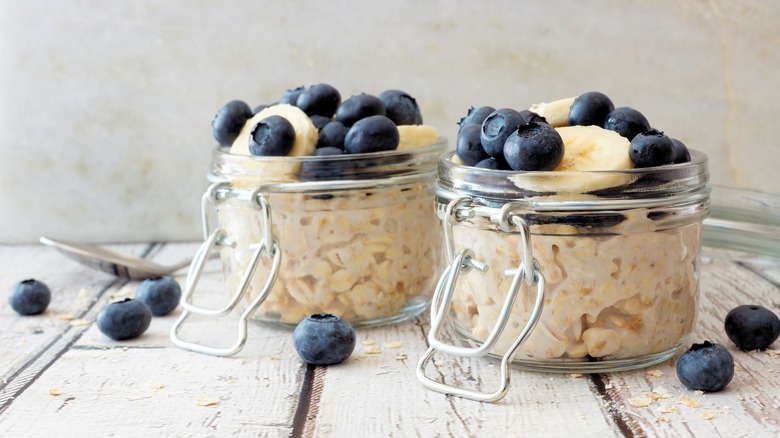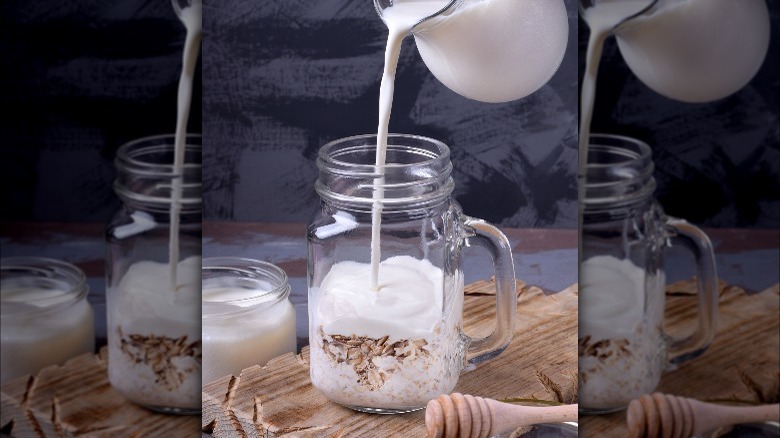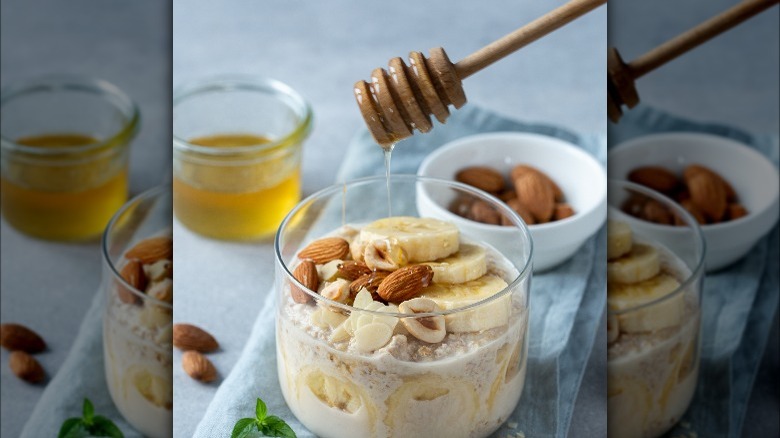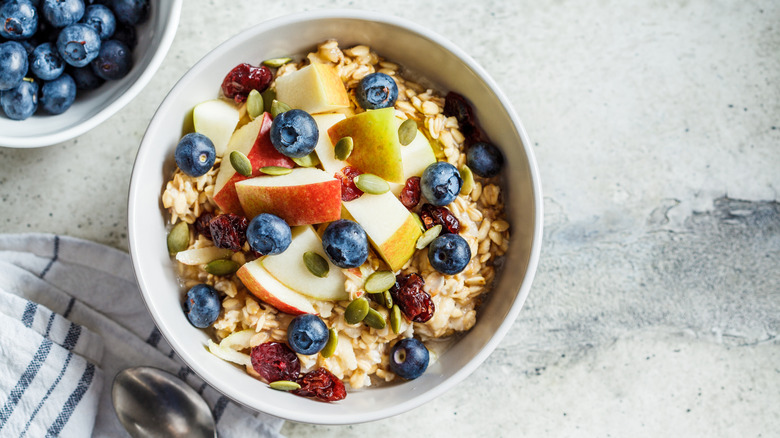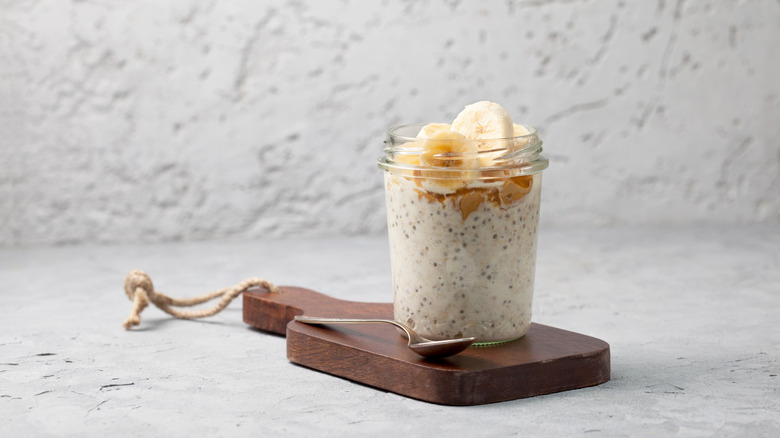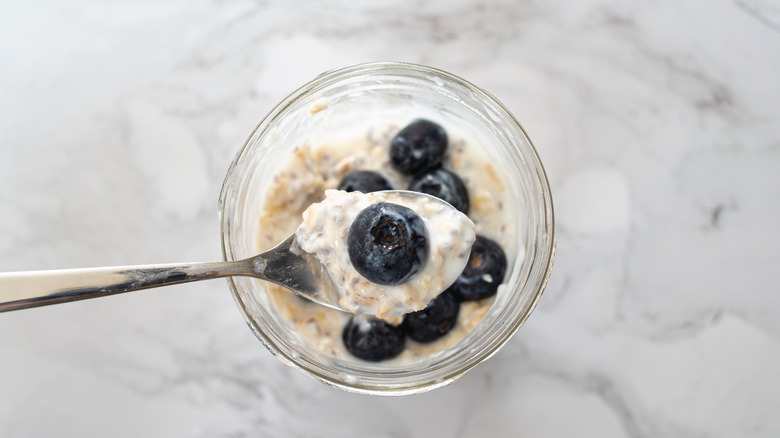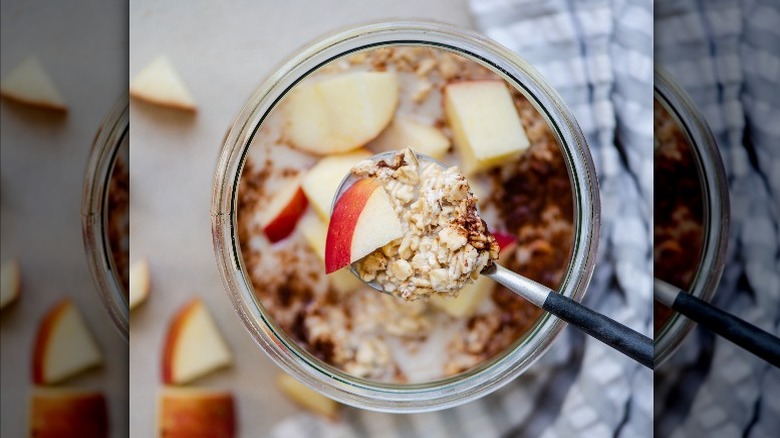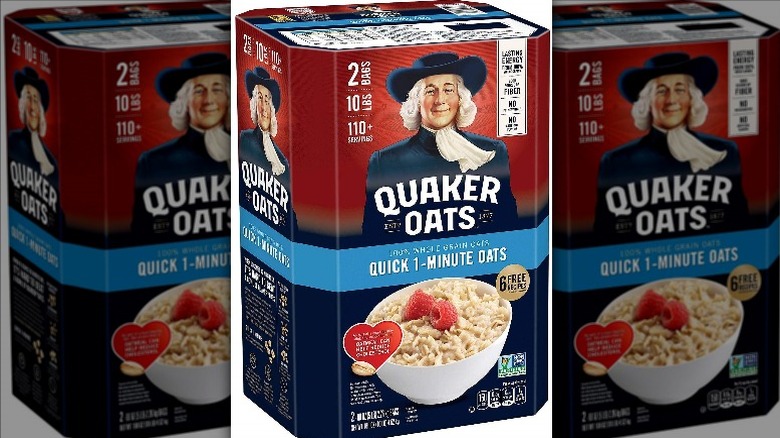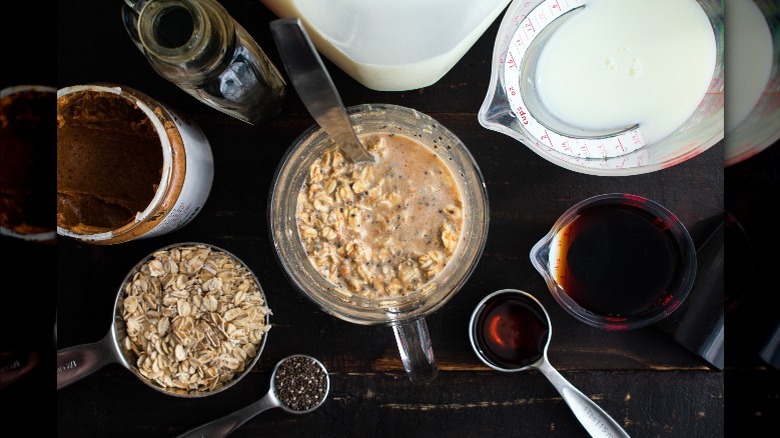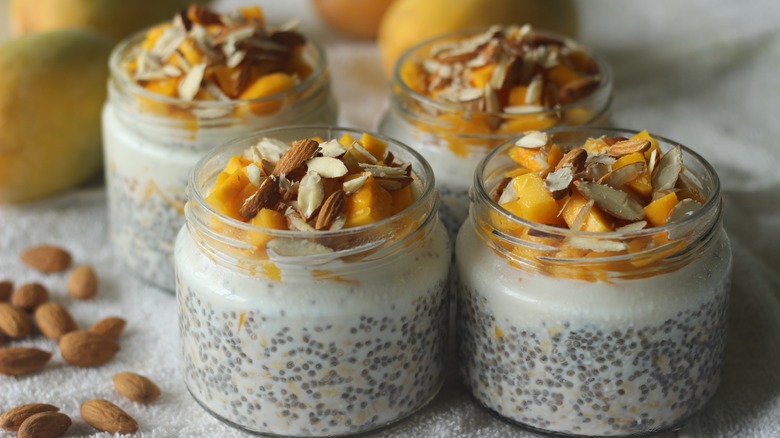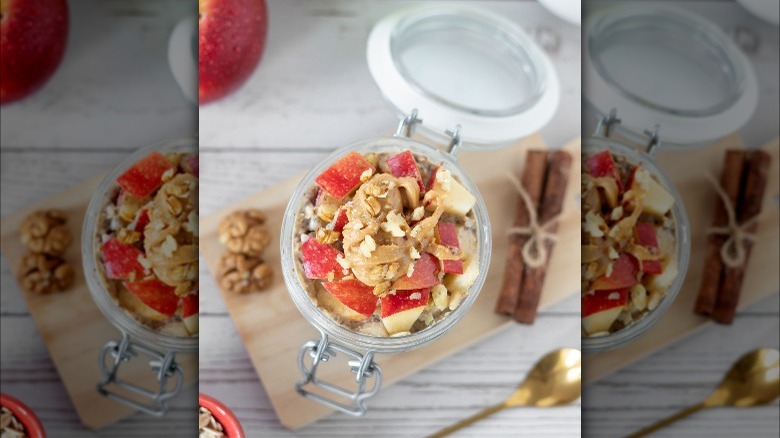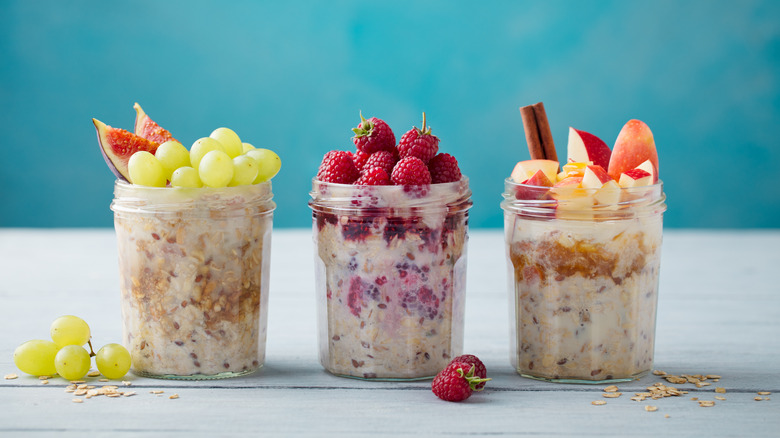14 Mistakes To Avoid When Preparing Overnight Oats
Overnight oats offer a no-cook method for preparing oatmeal, with the oats softening as they soak in milk overnight. This eliminates the need to cook them on the stovetop or in the microwave, as would otherwise be required. When you prepare overnight oats in the evening, your breakfast for the following morning will be ready and waiting for you. This can be a real lifesaver on busy mornings when you need to get out the door quickly.
However, as straightforward as making overnight oats may sound, there are actually several mistakes that people make that can have a negative impact on the flavor or texture of the finished product. Other mistakes have the potential to make the meal unsafe, create more work for yourself, and prevent you from enjoying the oats as you should. If you are eager to learn more about these various mistakes so you can avoid them the next time (or first time) you attempt to make overnight oats, keep reading.
Not adding the correct amount of milk
If you do not add the correct amount of milk (or the liquid of your choice), your overnight oats are not going to turn out properly. Adding too little milk will prevent the oats from expanding enough. This will leave them tasting too crunchy and uncooked. Conversely, if you add too much milk, you're going to end up with a much soupier consistency than you want. Your oats will more closely resemble porridge than oatmeal and will not be as enjoyable to eat.
So, just how much milk should you use when making overnight oats? The exact ratio to follow will vary based on your preferred consistency for oatmeal and which mix-ins (if any) you'll be adding. If you prefer your oats with minimal excess liquid or will be adding some moist mix-ins, you may find that a ratio of 1 part oats to 1 part milk is best. If you are adding several other mix-ins and/or like your oatmeal to be thinner, then a ratio around 1 part oats to 2 parts milk may be ideal. You may need to do some experimenting the first few times you prepare overnight oats to determine the ideal mix of milk and oats for your liking.
Forgetting to add salt
If you've made overnight oats before, did you add salt to the mixture before letting the oats soak in the refrigerator? If not, then that's one mistake you've been making. Many of us have been conditioned to see adding salt as a bad thing. And, while it is true that too much salt is not healthy, some is often necessary to ensure your recipes taste right. It can help bring out sweeter flavors and prevent foods from tasting too bland. Overnight oats made without salt may taste overly plain and unexciting.
You don't need to add a lot of salt to your overnight oats. Just a pinch will be enough to deliver the benefits of bringing the flavors up a notch and helping enhance their sweetness. If you don't believe this, try an experiment. Make two separate containers of overnight oats following the same recipe. Add a pinch of salt to one of them. The next morning, taste the difference for yourself.
Skipping ingredients that will give the oats some flavor
Salt is one important ingredient to enhance the flavor of your oats. However, it alone will not be sufficient to make them truly enjoyable. Unless you want plain and boring oats (who does?), it is important to add other ingredients that will help take the flavor up a notch or two. One option is to add something like peanut butter or a nut butter of some kind. Beyond the flavor these butters will add, they can also help thicken up the oats and give them a smoother texture.
Honey or agave nectar are other popular additions that will sweeten up the oats nicely. You can also add some of your favorite spices to your overnight oats recipe. Cinnamon, nutmeg, and pumpkin pie spice are all good choices. Adding fruits — either fresh or dried — can also help boost the flavor profile of your overnight oats. Fruits are naturally sweet and will impart some of their sweetness into the oats.
Adding too much sugar or sweet ingredients
While you want to make sure that your oats are sweet enough to enjoy, it is important not to go too far when adding more sugary ingredients. Overnight oats make it possible to create a quick and easy breakfast that is also rather healthy. You don't want to undo the health benefits by making your oats too sugary. If the sugar content of your oats is too high, it can cause your blood sugar to spike. A diet high in sugar can increase the risk of developing cardiovascular disease, obesity, and becoming diabetic.
Instead of pouring in lots of refined sugar, opt for more natural sweeteners. Honey, dates, and fruits are all good options. Though, still make sure you don't go overboard. While these items are naturally sweet, they should still be enjoyed in moderation. 1 tablespoon of honey, about 1 cup of fresh fruit, or about 1/4 cup of dried fruit should be sufficient.
Not adding the toppings at the right time
One of the biggest mistakes people make when preparing overnight oats is not adding the toppings at the right time. Many toppings should not be added until right before you're ready to dig into your oats. If you add fresh fruit, nuts, granola, and many other toppings when you're mixing the overnight oats in the evening, they're going to be soggy by the morning. Sitting in the milk will change their texture, and likely in a way that you won't enjoy. Put these toppings aside and only add them immediately before you're ready to eat your oatmeal.
However, there are a few toppings that should be added the night before and allowed to soak in the milk with the oats. Chia seeds, for example, should go in when you mix the milk and oats together. If they don't have enough time to absorb some liquid, they're going to be too hard and crunchy. Similarly, dried fruit can also go in the night before when you're preparing the oats. As it soaks in the liquid, it will absorb some of it and become a bit plumper and softer.
Leaving the oats out on the counter for too long
The next time you make overnight oats, make sure that you don't leave them sitting out on the counter for too long. Leaving them out for too long — either when you're in the process of combining the ingredients or the following morning before you start eating them — can threaten your health. Milk is a perishable ingredient. Whether mixed in with the oats or alone, it should not remain out of the fridge for longer than two hours at the most.
If the milk stays at room temperature for longer than this (or even a shorter amount of time if temperatures are hotter), bacteria can start growing. The milk (or the oats) may not even smell off, but consuming it can still increase the risk of food poisoning. Food poisoning symptoms can vary, but may include nausea, diarrhea, or stomach camping. Dehydration and the need for hospitalization can also occur, especially if the symptoms last for several days. It is just better to be safe than sorry and make sure that you get your overnight oats prepared and in the refrigerator quickly and that you eat them promptly once removing them.
Not giving the oats enough time to soak before eating them
Overnight oats aren't called overnight oats for nothing. By definition, the oats must soak for several hours (overnight) before they'll be ready to enjoy. Ignoring this soaking time recommendation will be a mistake. If you're craving overnight oats for breakfast, but forgot to prepare them the night before, you'll want to choose something else to eat rather than combining the ingredients and consuming them too early.
Without a minimum of 12 hours soak time, the phytic acids will not have enough time to break down. This will leave the oats tasting raw and crunchy. In addition to not tasting good, eating raw oats can also cause stomach aches. When oats are given sufficient time to soak and ferment in the milk, they will include more good bacteria. This good bacteria will make it easier for your body to digest them. If you prefer your oatmeal to be even softer, try to give the oats more than 12 hours to soak. The longer they're sitting in the milk, the softer they'll get.
Eating the oats before stirring them
Picture this: You're ready to eat breakfast and have a jar of overnight oats in the fridge that you prepared the night before. You remove the jar from the fridge, grab a spoon, and take a scoop out to eat. Did you make a mistake? Unfortunately, the answer is yes. The mistake was forgetting to stir the oats before starting to eat them.
Because the oats have been sitting in the refrigerator for several hours, certain flavors are more concentrated in different sections of the jar. Some key ingredients may have dropped to the bottom of the jar. This means that if you start eating without stirring the oats first, the various flavors aren't going to be evenly spread throughout the oats. Some bites may be too sweet, while others may be too bland. Stirring takes just a few seconds, so fortunately this is a very easy mistake to remedy and avoid making in the future.
Using instant oats
Instant oats can be a good choice if you're looking to prepare a bowl of oatmeal right before you're ready to eat it. They only take a few minutes to cook, which can make them a nice time saver. However, if you're making overnight oats, you do not want to use instant oats. The reason that instant oats are able to cook on the stovetop or in the microwave so much more quickly than other types of oats is because they are much finer and thinner.
If you use instant oats for overnight oatmeal, you are not going to like the way the finished result tastes. The thin and fine texture of the instant oats will all but dissolve in the milk as they soak for hours. The finished product will be mushy and not at all enjoyable. Old-fashioned rolled oats will be your best option when preparing overnight oats. As they soak in the milk overnight, they'll absorb plenty of liquid, giving them the ideal taste and texture the following morning.
Not planning ahead and making multiple portions at the same time
Once you've experimented with a few different overnight oat recipes and mix-in options, you should save yourself some time and effort and make multiple portions at the same time. You'll find that the time it takes you to double or triple your recipe over several jars will be much less than the cumulative amount of time it will take to make an individual serving of overnight oats three different days in a row.
If you're planning on enjoying overnight oats for breakfast more than once during the week, then you might as well prep several servings at the same time. Making a few servings at the same time will leave you with more time in the evenings and still ensure that you have a healthy and delicious breakfast ready to go in the morning. If you make multiple servings tonight, you'll thank yourself tomorrow night when you're able to put up your feet and relax instead of making another batch of oats.
Making too many portions in advance
Before you go crazy and make enough servings of overnight oats to fill up your fridge, keep food safety in mind. According to the USDA Food Safety & Inspection Service, you should only keep cooked meals in your fridge for a maximum of four days. If you keep prepared food, such as overnight oats, in the fridge for longer than this, you're at a greater risk of food poisoning when you eat it.
This means that you could make a maximum of four servings of overnight oats at a time, as long as you're planning on eating them for four mornings in a row. If there are multiple people in your home who will also be eating the oats, you could make additional servings. Labeling each jar with the date the oats were prepared (you can use painter's tape for this job) will help you avoid keeping them for too long.
Thinking you won't be able to make overnight oats if you're out of milk
You have your oats and all of your planned mix-ins laid out on your kitchen counter. The jars for the overnight oats are clean and ready to be filled. You open the refrigerator to grab the milk so you can start getting everything ready, only to realize that someone in the house drank the rest of it. Are you out of luck? Do you need to either put everything back away and suffer without your overnight oats in the morning, or brave a late night run to the grocery store?
Fortunately, you don't have to choose either of these options. Milk isn't the only liquid you can use to make overnight oats, so you may have a suitable substitute sitting in your refrigerator already. While the oats won't be as creamy, you can use plain water in place of milk. Yogurt mixed with some water is another viable option. You could also try using juice to make your overnight oats. Nearly any liquid will work, you'll just want to think about the flavor it will offer to the finished product to help you choose the best option.
Not making your oats in the right type of container
Believe it or not, using the wrong container can also be a mistake when making overnight oats. First, you want to make sure that the container you choose is large enough to hold all of the ingredients, while still leaving some room for you to stir the oats around. You don't want to start adding the ingredients only to realize that you need to dump them into another container to be able to complete the recipe.
It is also essential to choose a container that has a lid. You need to leave your overnight oats in an airtight container when they are in the refrigerator. If not properly sealed, the oats may absorb the various odors in your refrigerator as they soak, which is likely to negatively alter the way they taste. Moreover, unsealed jars in the refrigerator are just a bad idea in general. If the jar gets knocked over, not only will you be without breakfast the following morning, but you'll also have a big mess to clean up. If you're trying to decide which type of container checks all of these boxes, you can't go wrong with a mason jar.
Always following the same recipe
With so many different overnight oats recipes to try, you'll really be doing yourself a disservice if you always make the same one. Sure, you might really like the recipe you make, but if you don't branch out and try new things, you don't know what you're missing out on. It's possible there is a new recipe waiting for you that you might like even more than your current favorite. Plus, eating the same thing time after time can get very boring. Sure, you like the recipe you're following now, but will you feel the same way after a few weeks or months? Don't risk turning yourself completely off overnight oats by only using the same ingredients every time you make them.
There are lots of ways you can change up your overnight oats to make them new and exciting. Try using different mix-ins, adding toppings, experimenting with adding yogurt to the oats, or trying some milk-free vegan recipes. Some combinations to try include apples and cinnamon, blueberries and chia seeds, coconut and cranberries, or even peanut butter and jelly.
